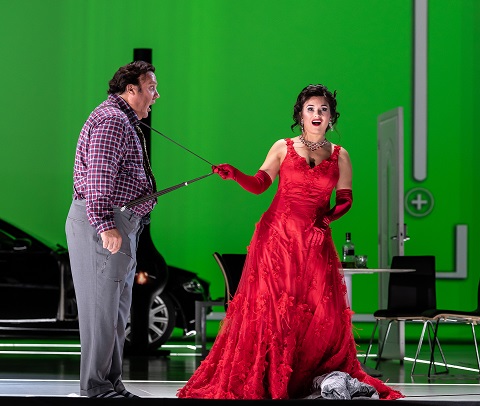
16 Oct 2019
Donizetti's Don Pasquale packs a psychological punch at the ROH
Is Donizetti’s Don Pasquale a charming comedy with a satirical punch, or a sharp psychological study of the irresolvable conflicts of human existence?
English Touring Opera are delighted to announce a season of lyric monodramas to tour nationally from October to December. The season features music for solo singer and piano by Argento, Britten, Tippett and Shostakovich with a bold and inventive approach to making opera during social distancing.
This tenth of ten Live from London concerts was in fact a recorded live performance from California. It was no less enjoyable for that, and it was also uplifting to learn that this wasn’t in fact the ‘last’ LfL event that we will be able to enjoy, courtesy of VOCES8 and their fellow vocal ensembles (more below …).
Ever since Wigmore Hall announced their superb series of autumn concerts, all streamed live and available free of charge, I’d been looking forward to this song recital by Ian Bostridge and Imogen Cooper.
The Sixteen continues its exploration of Henry Purcell’s Welcome Songs for Charles II. As with Robert King’s pioneering Purcell series begun over thirty years ago for Hyperion, Harry Christophers is recording two Welcome Songs per disc.
Although Stile Antico’s programme article for their Live from London recital introduced their selection from the many treasures of the English Renaissance in the context of the theological debates and upheavals of the Tudor and Elizabethan years, their performance was more evocative of private chamber music than of public liturgy.
In February this year, Albanian soprano Ermonela Jaho made a highly lauded debut recital at Wigmore Hall - a concert which both celebrated Opera Rara’s 50th anniversary and honoured the career of the Italian soprano Rosina Storchio (1872-1945), the star of verismo who created the title roles in Leoncavallo’s La bohème and Zazà, Mascagni’s Lodoletta and Puccini’s Madama Butterfly.
Evidently, face masks don’t stifle appreciative “Bravo!”s. And, reducing audience numbers doesn’t lower the volume of such acclamations. For, the audience at Wigmore Hall gave soprano Elizabeth Llewellyn and pianist Simon Lepper a greatly deserved warm reception and hearty response following this lunchtime recital of late-Romantic song.
Collapsology. Or, perhaps we should use the French word ‘Collapsologie’ because this is a transdisciplinary idea pretty much advocated by a series of French theorists - and apparently, mostly French theorists. It in essence focuses on the imminent collapse of modern society and all its layers - a series of escalating crises on a global scale: environmental, economic, geopolitical, governmental; the list is extensive.
For this week’s Live from London vocal recital we moved from the home of VOCES8, St Anne and St Agnes in the City of London, to Kings Place, where The Sixteen - who have been associate artists at the venue for some time - presented a programme of music and words bound together by the theme of ‘reflection’.
'Such is your divine Disposation that both you excellently understand, and royally entertaine the Exercise of Musicke.’
Amongst an avalanche of new Mahler recordings appearing at the moment (Das Lied von der Erde seems to be the most favoured, with three) this 1991 Mahler Second from the 2nd Kassel MahlerFest is one of the more interesting releases.
‘And there was war in heaven: Michael and his angels fought against the dragon; and the dragon fought and his angels, And prevailed not; neither was their place found any more in heaven … that old serpent … Satan, which deceiveth the whole world: he was cast out into the earth, and his angels were cast out with him.’
If there is one myth, it seems believed by some people today, that probably needs shattering it is that post-war recordings or performances of Wagner operas were always of exceptional quality. This 1949 Hamburg Tristan und Isolde is one of those recordings - though quite who is to blame for its many problems takes quite some unearthing.
There was never any doubt that the fifth of the twelve Met Stars Live in Concert broadcasts was going to be a palpably intense and vivid event, as well as a musically stunning and theatrically enervating experience.
‘Love’ was the theme for this Live from London performance by Apollo5. Given the complexity and diversity of that human emotion, and Apollo5’s reputation for versatility and diverse repertoire, ranging from Renaissance choral music to jazz, from contemporary classical works to popular song, it was no surprise that their programme spanned 500 years and several musical styles.
The Academy of St Martin in the Fields have titled their autumn series of eight concerts - which are taking place at 5pm and 7.30pm on two Saturdays each month at their home venue in Trafalgar Square, and being filmed for streaming the following Thursday - ‘re:connect’.
The London Symphony Orchestra opened their Autumn 2020 season with a homage to Oliver Knussen, who died at the age of 66 in July 2018. The programme traced a national musical lineage through the twentieth century, from Britten to Knussen, on to Mark-Anthony Turnage, and entwining the LSO and Rattle too.
With the Live from London digital vocal festival entering the second half of the series, the festival’s host, VOCES8, returned to their home at St Annes and St Agnes in the City of London to present a sequence of ‘Choral Dances’ - vocal music inspired by dance, embracing diverse genres from the Renaissance madrigal to swing jazz.
Just a few unison string wriggles from the opening of Mozart’s overture to Le nozze di Figaro are enough to make any opera-lover perch on the edge of their seat, in excited anticipation of the drama in music to come, so there could be no other curtain-raiser for this Gala Concert at the Royal Opera House, the latest instalment from ‘their House’ to ‘our houses’.
"Before the ending of the day, creator of all things, we pray that, with your accustomed mercy, you may watch over us."

Is Donizetti’s Don Pasquale a charming comedy with a satirical punch, or a sharp psychological study of the irresolvable conflicts of human existence?
Old and young, rich and poor, spendthrift and miser, dreamer and realist: the opera, through the interventions of Dr Malatesta, tells us, it seems, that such discords can be reconciled. Or does it? In his new production at the Royal Opera House (shared with Paris and Palermo), director Damiano Michieletto suggests that Malatesta’s ‘magic’ is just that: a fantasy happy ending at odds with realities of human life.
Michieletto and his design team (sets, Paolo Fantin; costumes, Agostino Cavalca; lighting, Alessandro Carletti) oppose two worlds, past and present, to illustrate internal and external divisions. This Don Pasquale lives a nostalgic dream of times past. His house is an iconographical relic of his childhood. A sepia photograph of his mother rests affectionately on a bed-side table; his living room and kitchen celebrate 1950s design, and Pasquale’s frugality; family heirlooms - a grandfather clock and nineteenth-century landscape painting - evoke the spirit of history. At times, Pasquale slips back into wistful memories: an unhealthy yellow-green tint bathes the stage as ‘ghosts’ of his boyhood self enter, and perch on Pasquale’s knee, or playfully blow out the candles on a birthday cake.
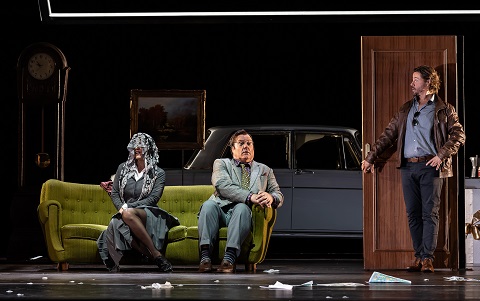 Olga Peretyatko as Norina, Bryn Terfel as Don Pasquale and Markus Werba as Malatesta. Photo credit: Clive Barda.
Olga Peretyatko as Norina, Bryn Terfel as Don Pasquale and Markus Werba as Malatesta. Photo credit: Clive Barda.
However, the fragility of Pasquale’s nostalgic dreaming is exposed by the neon strip lights which form a cruelly bright cat’s-cradle roof above Fantin’s sparse revolving set. The latter is littered with doors unconnected to any walls which might prevent the fantasy from falling down. When Pasquale starts to think of the future - if his recalcitrant nephew won’t obey his instructions, and marry as Pasquale commands, then he will disinherit the sulky spendthrift and take a young bride himself to ensure a brood of heirs to prevent Ernesto getting his hands of the family fortune - then disaster is inevitable.
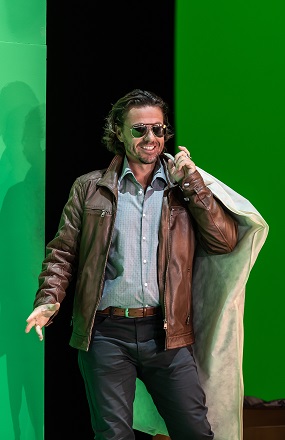 Markus Werba as Malatesta Photo credit: Clive Barda.
Markus Werba as Malatesta Photo credit: Clive Barda.
Malatesta proposes his sister, the virginal ‘Sofronia’, fresh out of the convent, as a suitable marriage match, and Pasquale is delighted. But, when his bashful bride morphs into a reckless fortune-hunter who plans to bling-up his house, spend his money on fast cars and fancy frocks, and dash around town with a mystery lover while he’s left lounging alone on his new sofa, staring at his minimalist décor, he is less thrilled. The decorators arrive and begin dismantling his home. In desperation, Pasquale clings to his grandfather clock, enmeshed in the plastic sheeting which condemns his past to history. It’s an image of pathos, whatever Pasquale’s flaws.
Michieletto emphasises the cruelty inflicted upon Don Pasquale by Norina and Malatesta, and if this doesn’t dampen the innate comedy then this is in no small part due to the wily acting of Bryn Terfel as the lecherous old Pasquale. There’s a touch of Terfel’s Falstaff in Don Pasquale’s lustful, deluded, anticipation of the bliss that awaits him: his housekeeper dyes his hair, he discards his grubby pyjamas and crams his corset-restrained belly into his ‘smart’ trousers, pulling up the zip with a playful whoop. Terfel manages the transformation from misanthropic miser to would-be Romeo, and later to despairing dupe, will enormous skill - and fine judgement of the details that will tell. His baritone may have lost some of its smoothness and warmth, but it’s a ‘human’ voice that conveys feelings directly and with sincerity - just what’s needed here. And, Terfel makes sure that the text does its work too, enunciating the Italian with expressive nuance.
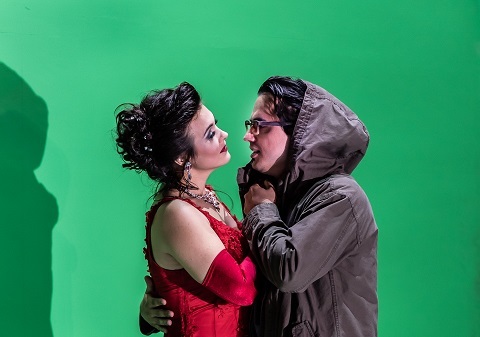 Olga Peretyatko as Norina and Ioan Hotea as Ernesto. Photo credit: Clive Barda.
Olga Peretyatko as Norina and Ioan Hotea as Ernesto. Photo credit: Clive Barda.
Terfel was equalled, perhaps eclipsed, by Russian soprano Olga Peretyatko, making a superb Royal Opera debut as a hard-hearted, on-the-make Norina. The gold-digger shoves aside the dull patina of Pasquale’s past with a blast of colour and light. We are first introduced to Norina in her workplace: a fashion photographer’s studio, where she’s a dresser. The clothes-rail of couture, the flashing cameras and the posing models embody her own dreams of fame and fortune - the latter emphasised by projected video images which also reinforce her role-playing insincerity. Peretyatko has natural comic flair which helped to keep our sympathies in good balance, though the famous slap which she dishes out to her disgruntled husband in Act 3 seemed unnecessarily vicious. Technically, she was immaculate, breezing through the coloratura and demonstrating how to trill with delicious delicacy. Her soprano had just the right sharpness of edge as it rose, to convey Norina’s ruthlessness.
Romanian tenor Ioan Hotea struggled a little with some of the higher reaches of Donizetti’s music for Ernesto, though the final duet for Norina and Ernesto was well-sung. But, with Michieletto seemingly disinterested in Ernesto’s romantic dreams, it wasn’t clear what the minx would see in this teddy-bear clutching moocher, who with the help of Pasquale’s put-upon, chain-smoking housekeeper, when disinherited and evicted, douses Pasquale’s precious classic car with oil. One could only wonder what the old man had done to deserve such punishment and payback.
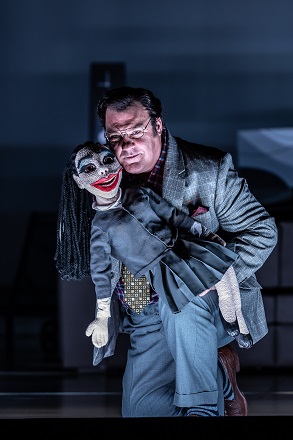 Bryn Terfel as Pasquale, holding a puppet of Norina. Photo credit: Clive Barda.
Bryn Terfel as Pasquale, holding a puppet of Norina. Photo credit: Clive Barda.
Markus Werber is a suave, handsome schemer - though not necessarily a convincing ‘doctor’ - and equals Terfel for panache in their patter duet: all the more impressive as they have to manipulate puppets while scooting through the syllables - and a neat suggestion that Pasquale is imagining taking back control while we can see that it’s Malatesta who is really pulling the strings. The puppets are Michieletto’s solution to Donizetti’s failure to really integrate the chorus, who don’t appear until late in the day, and three puppeteers kept us entertained when Pasquale’s servants reflected on his misfortunes. In the pit, Evelino Pidò led a vibrant and well-paced account of the score.
Only the ending seemed a false note. The deception revealed, the humiliated but humbled Don Pasquale forgives everyone and gives a green light to Norina and Ernesto’s marriage; he recognises that although Malatesta has tricked him, the trials of his pseudo-marriage have in fact saved him from his own stubbornness and the very real disaster that would have ensued had he actually entered into wedlock with a younger woman. Michieletto eschews any such happy ending. Here, Pasquale is consigned to a wheelchair and packed off to a nursing home. An unnecessarily callous final act of cruelty? But, he has one consolation: he’s still got the keys to the house.
Claire Seymour
Donizetti: Don Pasquale
Don Pasquale - Bryn Terfel, Norina - Olga Peretyatko, Ernesto - Ioan Hotea, Doctor Malatesta - Markus Werba, Notary - Bryan Secombe, Actors (Sam Alan, Ashley Bain, Josh Cavendish, Peter Cooney, Jerome Dowling, Jane Eyers, Judith Georgi, Jamal Low, Lockhart Ogilvie, Jeremiah Olusola); Director - Damiano Michieletto, Conductor - Evelino Pidò, Set designer - Paolo Fantin, Costume designer - Agostino Cavalca, Lighting designer - Alessandro Carletti, Video designers - rocafilm, Orchestra and Chorus of the Royal Opera House.
Royal Opera House, Covent Garden, London; Monday 14th October 2019.